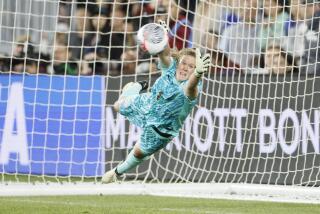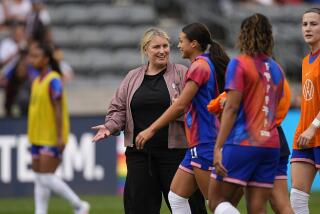Anne Pankowski is not used to not making the cut
- Share via
As a natural athlete, Anne Pankowski of Laguna Hills was accustomed to being among the best at any sport she tried.
That held true when she followed her older brother John into hockey, first on roller skates and then on ice. She always played with older kids and, because there weren’t many girls’ teams, she played alongside boys into her freshman year at Santa Margarita Catholic High.
“I think there was a lot support. The boys that I always played with were respectful and weren’t trying to hit me or do that kind of stuff, so that was good,” she said. “But I also showed them up a few times, so it kind of put some merit behind me being a girl and being a player.”
But after being selected for the U.S. women’s national team last summer and surviving two rounds of roster cuts leading to the Sochi Olympics, Pankowski finds herself in the unusual position of not being sure of a spot.
Team USA is carrying two more players than it can take to Sochi in February and Coach Katey Stone acknowledged that Pankowski, the youngest player at a month past 19, is on the bubble. The Olympic roster will be announced Jan. 1 during the NHL’s Winter Classic national telecast.
“I think it’s difficult, particularly when you haven’t even gone to college and you haven’t been in that five-, six-day-a-week, seven-month grind,” Stone said.
“Annie’s an incredibly talented player. She’s got a very big offensive upside to her. We’re just trying to get her up to the speed and the pace of the game and her defensive responsibilities when we don’t have the puck.”
Although this is a new test for Pankowski, she’s greeting it with her typical enthusiasm and intelligence.
“It’s been the biggest challenge I think I’ve ever faced,” said Pankowski, the only Californian on the squad. “I feel like I’m overcoming it but every day I’m being pushed to be better. It’s a learning experience and it comes with a sharp learning curve.”
Pankowski’s father, Richard, moved to California from New Jersey and brought his love of hockey with him. Annie, as she’s known, followed her brother and older sister Ali — now a defenseman on Princeton’s women’s team — into the rink.
Kathy McGarrigle, director of the Anaheim Lady Ducks program, remembers seeing something special in the kid who loved hockey so much that she’d play on the Junior Ducks’ mite and squirt teams when there were no girls’ teams and was a leader at age 8 or 9.
“She has always been a really coachable, really great kid. All-around smile on her face but also a pretty fierce competitor,” McGarrigle said.
“She showed really unique abilities to look around her and go, ‘We need to win this,’ and somehow, whether it was her passing to a teammate who was open to win the game, or her putting the puck in the net, or backchecking and playing defense and cutting off an opportunity for the other team, those were the kinds of things she just did when the moment was there and the time was there.”
Pankowski’s ability to read the game and her eagerness to improve remain as strong as her blistering shot.
“I think she’s a neat kid,” Stone said. “She’s very direct. She asks very good questions. Not just, ‘What can I do to get better?’ She’ll ask situational questions, so she’s really trying to think the game at a higher level.”
It’s whether Pankowski can add speed and new dimensions to her game that will determine whether she goes to Sochi.
“I’m trying to embrace what my role is on this team, which is different from teams I’ve been on before. And try to do my best playing that role,” she said.
“It’s more like a hard-worker kind of player, more than a goal scorer. Keeping everyone honest in practice, just giving it my best all the time even if it’s not highlight-reel goals, stuff like that.”
Team USA has spent most of this season training in Bedford, Mass., where Pankowski has shared an apartment with teammate Alex Carpenter, daughter of former NHL standout Bobby Carpenter.
“That’s been really hard, learning how to live on my own with my own car, learning to feed myself, do laundry. I’m learning stuff about real life,” she said.
Hockey is far easier, even now.
“I’m just trying to put my best foot forward every day,” she said, “and I know that even if it doesn’t work out, this has been the greatest experience in my life and the biggest learning curve and I’m just so grateful for the experience, even if it doesn’t end in Sochi.”
helene.elliott@latimes.com
Twitter: @helenenothelen
More to Read
Go beyond the scoreboard
Get the latest on L.A.'s teams in the daily Sports Report newsletter.
You may occasionally receive promotional content from the Los Angeles Times.







